Saturday Soapbox: The Trouble with Ouya
Ooyah! Right in the kisser.
This week, you couldn't dodge the Ouya. Already the most successful gaming Kickstarter yet with four weeks still left to run, it is a project that sells a dream. A $99 console that runs on Android aiming for a March 2013 launch, at the time of writing it has captured the imagination of 35,000 people to the tune of 4.4 million dollars, and counting fast. There's just one thing: the Ouya will never appear, and even if it does is doomed.
It's amazing how much has so far been written about the Ouya's capabilities without acknowledging the fact that its Kickstarter pitch is deliberately deceptive. The thing that engenders immediate distrust is the weaselly language and dubious claims made by the company's CEO and co-founder, Julie Uhrman, who does most of the talking in the pitch video.
First of all there's the use of 'free to play', with specific reference to popular examples of this model like Triple Town, League of Legends and Team Fortress 2. It's claimed all games on Ouya will be free to play. This is not the case. A game with a demo, according to the Ouya definition, is free to play. The phrase refers to a specific business model, and Ouya gives appropriate examples, but then... it's just not borne out.
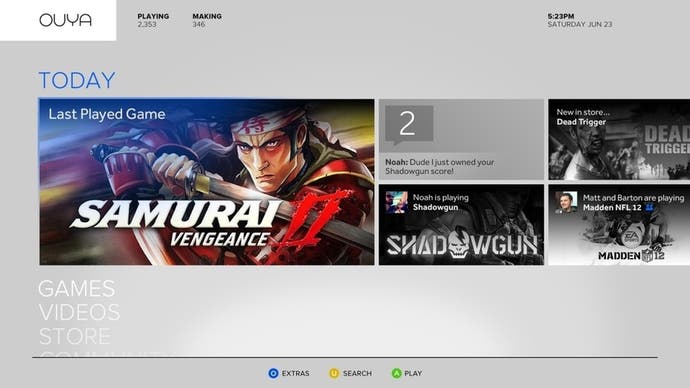
OK, so that's using industry jargon in an unfamiliar manner. Simple confusion, perhaps, though it doesn't inspire confidence. But free to play isn't the worst of it by a long shot. The most blatantly untrue claim is that "Minecraft will be on it," the exact words of Uhrman. Except... erm, it might, but only if the platform's a success and Mojang decide they want to put Minecraft on it. It's like me saying I'm going to marry Scarlett Johansson, as soon as I've become much richer, younger and better looking. With this claim Uhrman moves from re-defining jargon to simple deception.
The whole video is a cleverly edited confection, with more time spent watching a saw cutting a piece of wood with a controller drawn on top (seriously) than anything resembling a functional games console. The most impressive bit of mock-uppery Ouya has is a sexy-looking controller facade, though it also has an interface featuring game logos like Madden. Do you think Madden is going to appear on Ouya? Of course it isn't, and we'll come back to why - but it's interesting that the pitch is all about small developers and AAA console titles. Because the two don't have any crossover whatsoever.
It's one of the multitude of things that make no sense. Take the controller: nearly every single Android game is made for a touchscreen. The pitch begins by pointing out that gaming is moving away from the television towards portable devices. True enough. So Ouya's going to reverse this? I can't think of a single mobile phone game I'd want to play on my TV, controller or not. Not even a tablet game. Good designers make good games, and good games take account of their host platform - even if they upscale well, most mobile games are mobile games. They're snacks. I love Tiny Wings, but I don't want to play it on the TV.
Some may translate well to a controller - Luke Schneider, aka Radiangames, says on Gamasutra that he'll "very likely port my games to Ouya" if the machine is a reality. Schneider's right to point out that there are games that will port easily and suit a controller - shooters like his own Super Crossfire HD will be perfect. But even given these good fits, I think Ouya presents an insurmountable problem for potential developers, and one that guarantees the absence of exclusives.
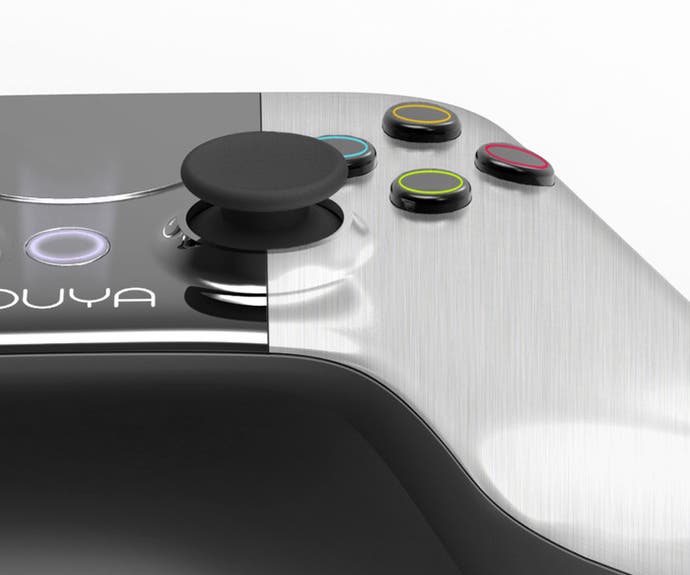
Ouya is claimed to be a developer-focused system. I think it's exactly the opposite, if you accept that developers need to earn a living. What Ouya offers developers beyond the PC, other than the brocade of television gaming, is yet another shard of Android customers and the cast-iron guarantee their software will be pirated.
This will be the easiest system in history on which to pirate software. Ouya is designed explicitly for modders and the hacking community: what this means is that within hours of its release there will be piracy, and within days of its release there will be organised piracy that will be incredibly easy to access. Think about the Ouya's early adopters. Is it going to be little Johnny? Is it heck - it's gaming nerds, with a good smattering of Android nerds among them. This is exactly the kind of person that not only knows about the potential of the Ouya, but is quite capable of putting the machine's USB 2.0 port to nefarious use.
Piracy isn't impossible on home consoles and tablets, of course, but you don't see Apple boasting that you can jailbreak your iPad. Pirating games on Ouya will require a quick google and a download. There will be beginner's guides in days, and you probably won't even need one. Open systems do not work for software sales; you are basically saying you'll build a business on an honesty box.
Here is an imaginary conversation:
Me: Hello Peter Moore! I have a new console, will you develop for it?
Fake Peter Moore: We'll certainly consider it. We at EA are always looking for ways to get great experiences to as many...

Me: Yeah yeah, it isn't in production yet but it's out in March, and we've made it so people can mod the console really easily. It's an open system, the future! So how about the next Madden? Cos... we kinda put the logo in our Kickstarter video. So it would really help.
Fake Peter Moore: Get out of my office.
Now look at this survey. Ouya are running, asking what games people want for this low-cost console alternative. Call of Duty? Skyrim? Mass Effect? Final Fantasy? Grand Theft Auto? Anyone who is taking these people seriously at this point, I've got a bridge you can buy.
What makes a console great? Not the hardware, or the operating system, but the software. Ouya may well turn out to be a reality, and if it does will doubtless have its defenders and a few flag-bearing devs, but at the moment there is not a single game confirmed to be in development for the console. Not one.
There's a brilliant book called Revolutionaries at Sony, which focuses on how Ken Kutaragi and a small team pulled the disparate parts of Sony's empire together over years to eventually launch the PlayStation. The original PlayStation was an absolute smash, and it was able to be that because of Sony's manufacturing agreements and capabilities, the established supply chain of Sony Music, a corporate giant's marketing muscle, and the ability to attract some of the best development houses in the world to work on unknown hardware. Even then, it needed Sony's deep pockets to initiate the $100 price cut that really saw the PlayStation take off.
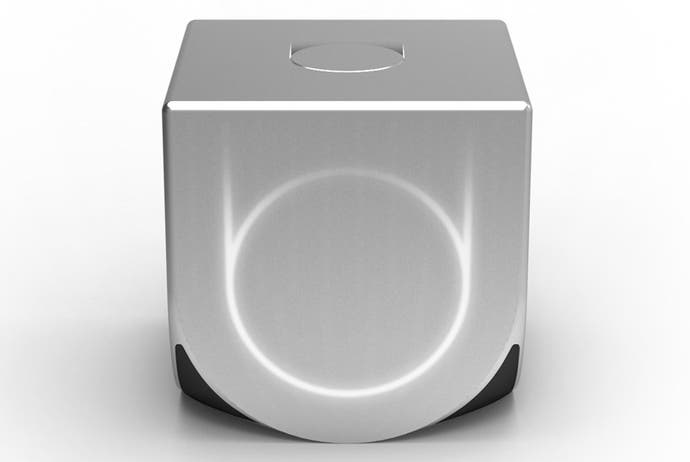
I am not saying that Ouya and the original PlayStation are like-for-like. The point is that behind the launch of a console there is a gigantic but invisible machine that must work in order for the product to get in enough living rooms. And that's presuming you even have a console to sell - unbelievably, the team behind the Ouya is acknowledging concerns about the hardware and hinting at additions. There is allegedly a functioning prototype of Ouya, but it hasn't been shown. The Kickstarter total is $4,400,000 and counting.
The alarm bells went off as soon as I saw Ouya, and they're still going. The worst thing is that Kickstarter, unintentionally but unavoidably, casts the illusion of investment: the common-or-garden human putting up their cash to see their kind of thing happen. The difference between Kickstarter and investing in something is that you don't get anything for your money unless the recipient delivers. If they don't? Well, you've got no shares, no legal rights (until a test case, at least), no comeback - thanks for the cash, Jack. $99 sounds like a hell of a bargain for a new console, but it's a lot of money to pay for nothing.
What Ouya shows is the desperation of a sizeable minority of gamers for something - anything - new. It's no coincidence that such a project should blow up after an E3 preceded by the usual PS4 and Xbox 720 rumours that ultimately produced little we hadn't seen before in both software and hardware. There is an appetite for something else in the console marketplace, but the chances of seeing this console, nevermind a launch line-up, in eight months feels like delusion. I think there are three possibilities with Ouya. One is that it is an outright scam. One is that its makers are sincere but hopeless dreamers. And the most likely is that this Kickstarter is to impress real investors. The gaming public is being leveraged in the hope that their money can be used to attract even more money.
Do you think this is too sceptical? I want to believe in something like Ouya. And that's the problem - we all do. That's what the people behind this have spotted. They're selling a dream, a beautiful but insubstantial promise. Ask yourself this: why does the pitch contain inaccuracies and deceits? More than anything, Ouya makes me think of a simple maxim. If something sounds too good to be true, it probably is.
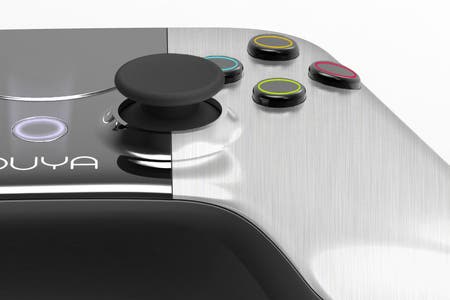

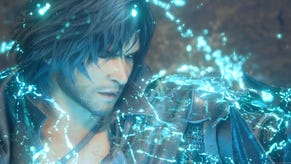

-3-31-23-screenshot.png?width=291&height=164&fit=crop&quality=80&format=jpg&auto=webp)




